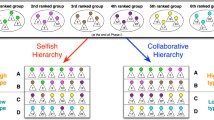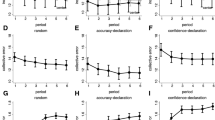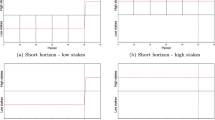Abstract
We analyze a class of coordination games in which the Kth player to submit an entry wins a contest. These games have an infinite number of symmetric equilibria and the set of equilibria does not change with K. We run experiments with 15 participants and with K=3, 7, and 11. Our experiments show that the value of K affects initial submissions and convergence to equilibrium. When K is small relative to the number of participants, our experiments show that repeated play converges to or near zero. When K is large, an equilibrium is often not reached as a result of repeated play. We seek explanations to these patterns in hierarchical thinking and direction learning.
Similar content being viewed by others
References
Bosch-Domènech, A., Nagel, R., García-Montalvo, J., & Satorra, A. (2002). One, two, (three), infinity: Newspaper and lab beauty-contest experiments. American Economic Review, 92(5), 1687–1701.
Camerer, C. F., Ho, T.-H., & Chong, J.-K. (2004). A cognitive hierarchy model of one-shot games. Quarterly Journal of Economics, 119(3), 861–898.
Cooper, D., & Kagel, J. (2004). Learning and transfer in signaling games. Working paper.
Costa-Gomes, M., Crawford, V., & Broseta, B. (2001). Cognition and behavior in normal from games: An experimental study. Econometrica, 69, 1193–1235.
Duffy, J., & Nagel, R. (1997). On the robustness of behavior in experimental ‘beauty contest’ games. Economic Journal, 107, 1684–1700.
Gneezy, U. (2005). Step-level reasoning and bidding in auctions. Management Science, 51(11), 1633–1642.
Haruvy, E., Stahl, D. O., & Wilson, P. (2001). Modeling and testing for heterogeneity in observed strategic behavior. Review of Economics & Statistics, 83, 146–157.
Nagel, R. (1995). Unraveling in guessing games: an experimental study. American Economic Review, 85, 1313–1326.
Selten, R., & Buchta, J. (1998). Experimental sealed bid first price auctions with directly observed bid functions. In I. E. D. Budescu & I. Erev (Eds.), Games and human behavior: Essays in honor of Amnon Rapoport. Mahwah: Lawrence Erlbaum Associates.
Slonim, R. L. (1999). Learning rules of thumb or learning more rational rules. Journal of Economic Behavior and Organization, 38, 217–236.
Sonsino, D., Erev, I., & Gilat, S. (1999). On rationality, learning, and zero-sum betting—An experimental study of the No Betting conjecture. Mimeo.
Stahl, D. (1993). Evolution of smart n players. Games and Economic Behavior, 5, 604–617.
Stahl, D. (2000). Rule learning in symmetric normal-form games: Theory and evidence. Games and Economic Behavior, 32, 105–138.
Stahl, D., & Wilson, P. (1994). Experimental evidence of players’ models of other players. Journal of Economic Behavior and Organization, 25, 309–327.
Van Huyck, J., Battalio, R., & Samuelson, L. (2001). Optimization incentives and coordination failure in laboratory stag hunt games. Econometrica, 69, 749–764.
Author information
Authors and Affiliations
Corresponding author
Rights and permissions
About this article
Cite this article
Carare, O., Haruvy, E. & Prasad, A. Hierarchical thinking and learning in rank order contests. Exp Econ 10, 305–316 (2007). https://doi.org/10.1007/s10683-007-9180-2
Published:
Issue Date:
DOI: https://doi.org/10.1007/s10683-007-9180-2




